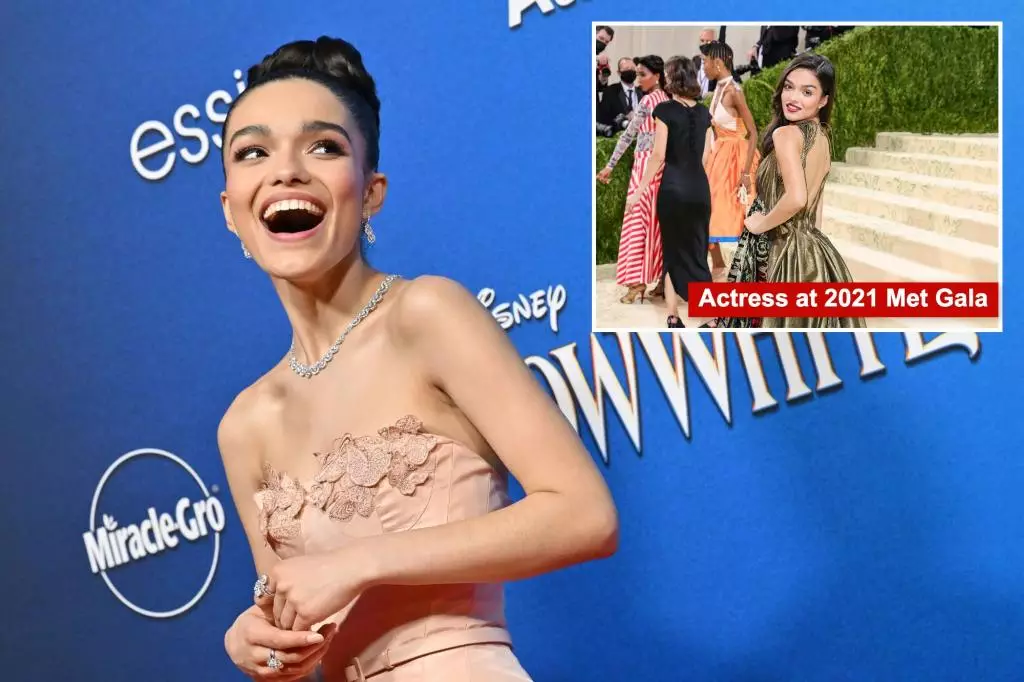Rachel Zegler has emerged as one of the most captivating figures in contemporary cinema, oscillating between heights of adulation and depths of controversy. Her rise to fame began with her role as the titular character in Disney’s live-action remake of “Snow White.” However, her outspoken nature—especially on social media—has rendered her a polarizing figure. Embracing her role as a trendsetter, she has found herself entrenched in a web of public discourse, making her the subject of controversy rather than just a recipient of accolades.
A headline-making invitation to the prestigious Met Gala, the fashion world’s equivalent of the Oscars, highlights both her celebrity status and the complexities surrounding it. While Zegler was nominated for an invite to the star-studded event, her commitment to the theater scene in London, where she will be rehearsing for her upcoming role in “Evita,” means she will unfortunately miss this year’s extravaganza. This is a significant decision, emphasizing her dedication to her craft and her eagerness to grow as a performer.
The Weight of Expectations
The allure of the Met Gala often stems from its glitzy atmosphere and the huge expectations placed on its attendees. Guests are not just invited; they are thrust into a societal spotlight that scrutinizes their every decision, from their outfits to their behavior. Zegler’s previous appearances have drawn their fair share of attention. Her 2021 attendance donned in a dazzling Dior Haute Couture gown was charming while her 2024 presence in an exquisite Michael Kors ensemble captivated fashion aficionados. However, the buzz surrounding her appearances has often been eclipsed by her controversial public opinions.
In the wake of her remarks regarding the character dynamics in “Snow White,” many fans took to social media to voice their discontent. Some labeled her comments as damaging, asserting that they undermined the nostalgic value of the beloved classic. Her critique of the Prince character as a “stalker” invited backlash from die-hard fans of the original film. The ensuing debates reflect the challenges faced by modern artists who tread the line between enlightened dialogue and the preservation of cherished narratives.
Social Media: A Double-Edged Sword
One cannot discuss Zegler without acknowledging her significant online presence. For artists today, particularly those in the public eye, social media is both an essential promotional tool and a potential minefield. Zegler’s ability to connect with her audience is commendable; however, her recent social media engagements—ranging from calls for political awareness to her biting remarks about public figures—have sparked conversations that arguably overshadow her artistic contributions.
Her comments about Trump and various sensitive global issues after his 2024 election victory drew sharp criticism, culminating in a public apology. Despite the backlash, one cannot dismiss the courage inherent in expressing personal views, particularly in a polarized social climate. Zegler has revealed herself to be a complex figure who balances the passions of youth with the pressures of a volatile industry.
Challenges Ahead: Navigating Fame and Responsibility
As Zegler continues on her artistic journey, the stakes grow increasingly high. The film industry is undergoing transformations in response to societal pressures regarding representation, particularly illustrated in her recent projects. The backlash surrounding her portrayal of “Snow White” speaks volumes about the evolving dynamics of storytelling, especially concerning classic narratives.
Moreover, the potential for vulnerability in creative spaces has repercussions beyond individual projects. For instance, the production’s struggles with representation of iconic characters such as the Seven Dwarfs only adds layers to the scrutiny Zegler faces. The financial setbacks experienced by “Snow White” have cast a long shadow on her reputation, creating a challenge not just for her but the entire production team.
Seeking Redemption through Talent
With Zegler poised to transition from Disney princess to a role in Andrew Lloyd Webber’s “Evita,” her talent remains indisputable. This next project arrives with heightened anticipation and expectations. If she can successfully channel her experiences—while redefining public perceptions—into her performances, Zegler could potentially shift the narrative surrounding her career. The question remains: can she navigate the delicate balance between her personal beliefs and the responsibility that comes with her celebrity status? In a world where art and social discourse collide, the answers may ultimately reveal themselves through her craft.

